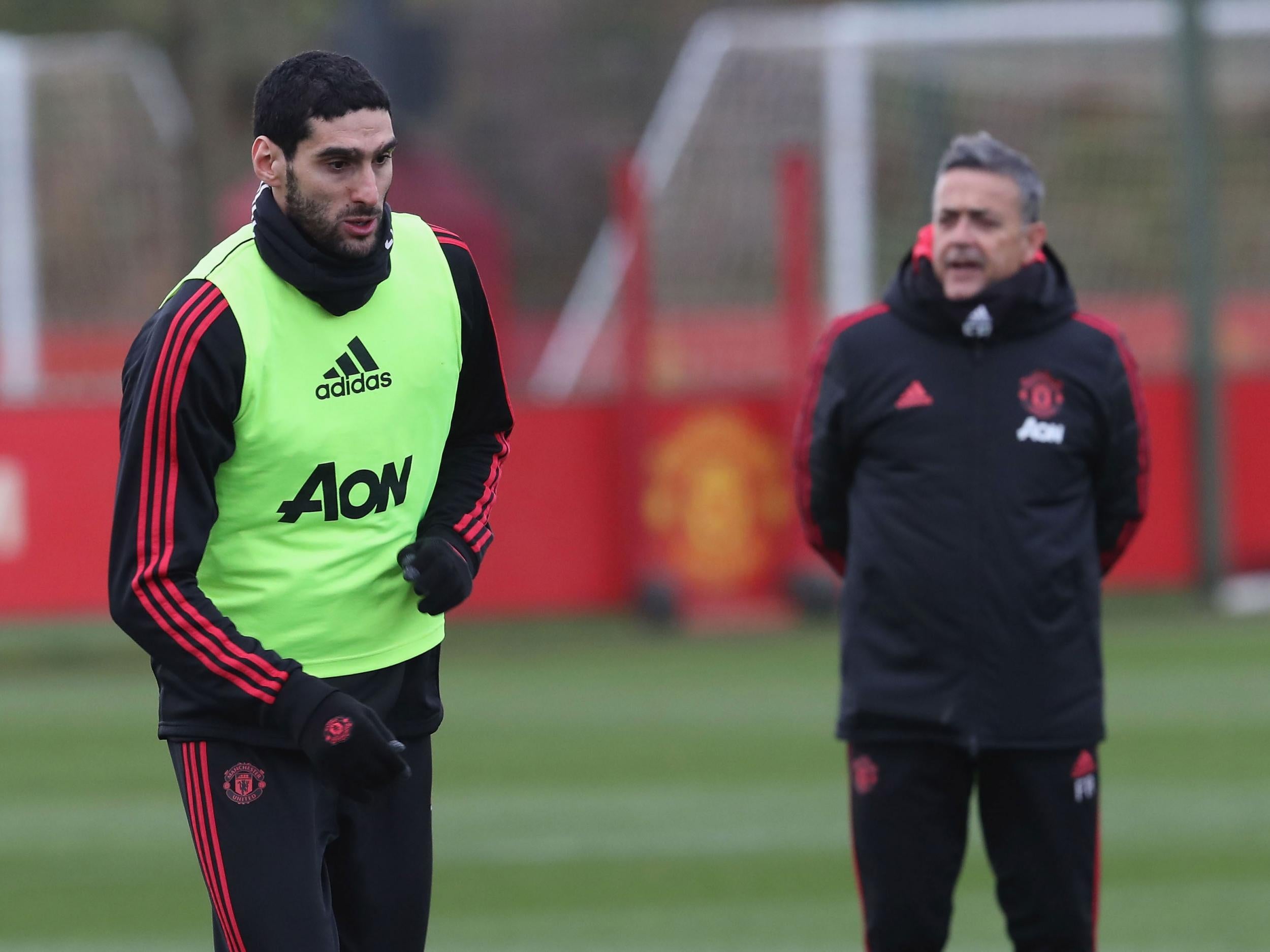If Marouane Fellaini is doing something right, Manchester United have usually done something wrong
Fellaini has turned his Old Trafford career around as Mourinho's stoppage-time battering ram, but he remains a perfect symbol of the struggles at the modern-day United
The first signing of the post-Sir Alex Ferguson era has seen the likes of Angel di Maria, Memphis Depay, Henrikh Mkhitaryan and Zlatan Ibrahimovic all come and go over the years at Old Trafford, all with varying degrees of success.
Yet Marouane Fellaini is still in Manchester, and though other players may be more technically gifted and universally respected, there are arguably few members of the current Manchester United squad that are as important to Jose Mourinho.
And while Mourinho is becomingly increasingly reliant on the Belgian to bludgeon United out of messes of their own making, Fellaini believes he is simply repaying a debt.
“I feel comfortable. I’m happy with him. He gives me a lot of confidence and he trusts me,” Fellaini said, after his stoppage-time strike to send a lacklustre United through to the Champions League knock-out stages. “That’s important for a player. I try to pay him back on the pitch.”
Fellaini is right, he does owe Mourinho. The questions that once surrounded the Belgian – chiefly, whether was worthy of the shirt, whether he was “a United player” – have not been asked quite as frequently over the past two years since his manager’s arrival.
The midfielder’s rebirth as Mourinho’s late battering ram – his ‘break in case of emergency’ Belgian – has elevated him towards something approaching cult hero status, especially among those supporters with a sense of irony, who can also appreciate a limited player extracting the maximum out of his abilities.
Fellaini’s displays during United’s triumphant 2016-17 Europa League campaign led fanzine United We Stand to adorn their end-of-season issue cover with Fellaini’s head emerging out of the old vase itself.
It was a suitably macabre celebration of this post-Ferguson United – an often-derided figure and a trophy this club has rarely cared about – but one that raised a fair point: if United are going to regularly resort to an agricultural brand of football, why not celebrate the player most effective at it?

“I try to give everything for the team,” Fellaini said on Tuesday night. “Starting or not starting. I think everybody knows now that I’m a team player. If I start, I give everything; if I go in [as a substitute], as well.” That is an attitude that, when combined with the odd important goal, wins supporters over.
Still, for all for goodwill towards him, and though he rarely receives enough credit for coming out the other side of some difficult years at Old Trafford, there is an inescapable sense that if Fellaini is doing something right, United have already done something wrong.
The Belgian was selected ahead of Paul Pogba against Young Boys and Pogba could have no complaints, given his dreadful performance at the weekend. But there was more than one occasion on Tuesday night when a United move would break down and Fellaini’s team-mates would indicate where he was supposed to run.

Then, though he would atone for it in stoppage time, there was also the glaring miss in opening stages in the second half, when Fellaini blazed a bouncing ball into the Stretford End when much of the goal was at his mercy.
It was only in those final stages, when Mourinho rolled out Plan B and moved Fellaini up front alongside his compatriot Romelu Lukaku, that the midfielder began to look comfortable and United’s attack found some sort of structure, albeit a rudimentary one.
Mourinho protested at his pre-match press conference that he does not encourage the numb, stultifying football his side now regularly serve up. “I want the team to start strong, go strong on the opponent, not to be waiting,” he insisted.
“Probably you or the fans think ‘Jose told them to start slow and play nice and easy’, or to be waiting for them to react. It is exactly the opposite to what we are trying. I want the team to go immediately and it is a bit frustrating.”
Starting Fellaini alongside the tidy but unspectacular Fred and the waning Nemanja Matic was a curious way to go about this. Perhaps a midfield including Pogba and Juan Mata would have been equally ineffective, but then is that not the issue? No combination of players appears able to carry out the quick, assertive style Mourinho claims to demand.
So, what then? Try the same thing and expect different results for 80-odd minutes, then move up Marouane. That is not Fellaini’s fault, of course, but you fear that even after turning his Old Trafford career around, he remains a perfect symbol of the struggles at the modern-day Manchester United.
Join our commenting forum
Join thought-provoking conversations, follow other Independent readers and see their replies
Comments
Bookmark popover
Removed from bookmarks